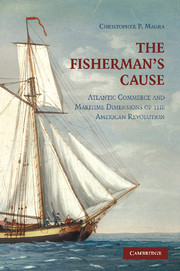Book contents
- Frontmatter
- Contents
- Acknowledgments
- Abbreviations
- Introduction
- Part One THE RISE OF THE COLONIAL COD FISHERIES
- Part Two ATLANTIC ORIGINS OF THE AMERICAN REVOLUTIONARY WAR
- 4 Cod and the Atlantic Economy
- 5 Atlantic Business Competition and the Political Economy of Cod: Part One
- 6 Atlantic Business Competition and the Political Economy of Cod: Part Two
- 7 The New England Trade and Fisheries Act
- Part Three THE MILITARY MOBILIZATION OF THE FISHING INDUSTRY
- Index
- References
4 - Cod and the Atlantic Economy
Published online by Cambridge University Press: 03 July 2009
- Frontmatter
- Contents
- Acknowledgments
- Abbreviations
- Introduction
- Part One THE RISE OF THE COLONIAL COD FISHERIES
- Part Two ATLANTIC ORIGINS OF THE AMERICAN REVOLUTIONARY WAR
- 4 Cod and the Atlantic Economy
- 5 Atlantic Business Competition and the Political Economy of Cod: Part One
- 6 Atlantic Business Competition and the Political Economy of Cod: Part Two
- 7 The New England Trade and Fisheries Act
- Part Three THE MILITARY MOBILIZATION OF THE FISHING INDUSTRY
- Index
- References
Summary
The lumber and provisions of the American colonies were more necessary to the West India islands than the rum and sugar of the latter were to the former.
While the crew scanned the Atlantic horizon for potential threats during the Seven Years' War, the twenty-nine-year-old master of a trade vessel fell asleep and dreamed of women. The vessel carried a cargo of sugar products that had been received in exchange for fish. According to Ashley Bowen, “[O]ne hundred leagues at sea on my passage home from the West Indies in [the] sloop Olive, I dreamed I saw an elderly woman with a girl of about 10 years old a-standing by her side.” After carefully considering the dream and the two females, Bowen concluded, “[T]he girl was the one I was to have.” He believed he had a vision of his future wife's appearance in her youth, and she had a mole on her cheek. As soon as Bowen returned to his homeport of Marblehead, Massachusetts, the foremost fishing port in mainland North America, the superstitious mariner began searching for the woman of his dreams. Eventually, he met Dorothy Chadwick, a woman with a mole on her cheek, and in time they married.
- Type
- Chapter
- Information
- The Fisherman's CauseAtlantic Commerce and Maritime Dimensions of the American Revolution, pp. 73 - 98Publisher: Cambridge University PressPrint publication year: 2009



